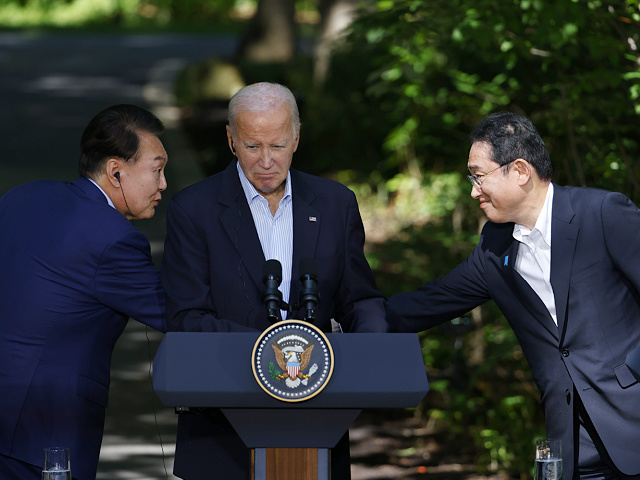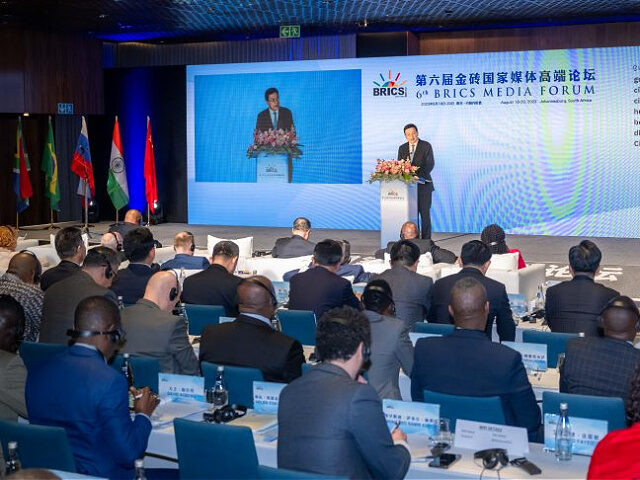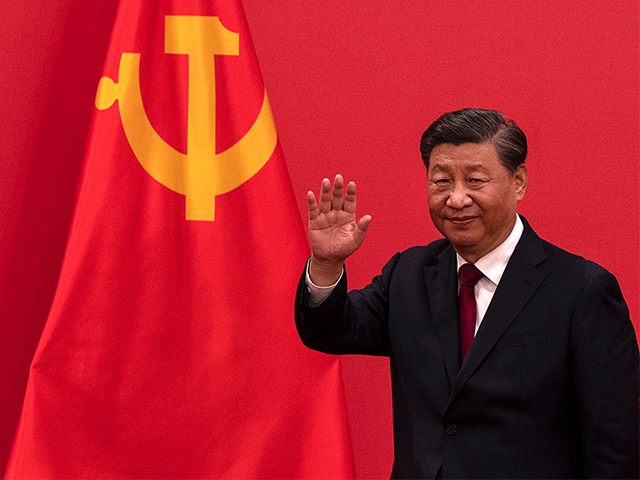The 2023 BRICS summit is scheduled for Tuesday through Thursday this week, bringing together the five member nations of Brazil, Russia, India, China, and South Africa to lay the groundwork for a world of post-American “inclusive multilateralism.”
Judging by the coverage in Chinese state media, that world looks like a China-dominated rejection of Western security and humanitarian concerns.
Chinese dictator Xi Jinping wrote an op-ed for South African media on Monday as he departed for Johannesburg to attend the summit. Xi’s letter reminded South Africa of China’s support — including, most recently, supplies to fight the global pandemic China unleashed — and praised South Africa for being the first nation on the continent to join China’s Belt and Road Initiative (BRI).
“Many Chinese companies are expanding their operation and at the same time taking more social responsibilities in South Africa. Automobiles and home appliances with Chinese brands yet made in South Africa are very popular among local consumers, and are now owned by numerous South African households,” Xi wrote.
“South African companies are also racing to invest in the Chinese market to seize the abundant business opportunities, and they have made important contributions to China’s economic growth,” he added.
Xi claimed China — which is currently menacing every other country bordering the South China Sea in an act of naked territorial aggression and tacitly supports its partner Russia’s savage invasion of Ukraine — is somehow the heart and soul of peace in the world, and South Africa is on the same cultural wavelength:
China and South Africa should be champions of our common interests. What the world needs today is peace, not conflict; what the world wants is coordination, not confrontation. China and South Africa, as natural members of the Global South, should all the more work together to appeal for greater voice and influence of developing countries in international affairs, promote accelerated reform of international financial institutions, and oppose unilateral sanctions and the “small yard, high fence” approach. We should jointly safeguard our common interests.
Xi touted a “China-Africa Leaders’ Dialogue” that would mimic, and directly counter, President Joe Biden’s sputtering outreach to Africa. Biden’s approach looks increasingly like a half-hearted attempt at checkbook diplomacy, while Xi promised to give African leaders front-row seats to the new Beijing-dominated world order he envisions:
I will work with African leaders to bring more active, effective and sustainable development initiatives to Africa, expand cooperation in agriculture, manufacturing, new energy and digital economy, and facilitate Africa’s economic integration, industrialization and agricultural modernization. China will continue to work for substantive progress in African Union’s joining of the G20 this year, and looks forward to a greater role by African countries and the AU in international and regional affairs.
Chinese state media on Monday boasted of the growing number of developing nations clamoring for membership in BRICS — a group of about 40 nations whose latest member, Algeria, joined in July. A few heavy-hitting economies have expressed interest in joining as well, including Saudi Arabia and the United Arab Emirates, a Middle Eastern partnership that has been growing more distant from the United States since Biden took office.
China’s state Xinhua news service gushed that BRICS has become “a positive, stable, and constructive force in international affairs” that offers alternatives to Western institutions like the International Monetary Fund (IMF):
Above all, BRICS defends multipolarity and multilateralism, Cuban President Miguel Diaz-Canel said. By doing so, “BRICS countries are countering the concept of the Cold War and opening up the possibility of a more equitable and just international order that benefits the world.”
“In an increasingly polarized world, BRICS is creating an enabling avenue for countries to fashion a more inclusive political and economic order,” said Cavince Adhere, a Kenyan international relations scholar.
Many countries are tired of the United States’ virtual domination of the global economy for decades, the Spanish website Rebelion said. Failure to comply with Washington’s directives results in sanctions and financial blackmail.
Xinhua hoped BRICS might introduce its own currency, a move that would advance Beijing’s long-held dream of dethroning the American dollar as a vital instrument of global trade. A greatly expanded BRICS alliance including most of the developing nations of the “Global South” would also neutralize what remains of the West’s ability to exert influence through economic sanctions.
“The first decisive step could be the development of BRICS’ shared currency, which would liberate a substantial part of the world from U.S. dollar domination,” Cameroon News Agency Director-General Xavier Messe A Tiati told Russia’s state-run Tass news agency on Monday.
“The U.S. is using its position to suffocate those countries that do not accept its ideology by introducing sanctions against them. As a result, sovereign states sometimes cannot use their dollar bank assets when they want to,” Tiati explained.
Writing at Oilprice.com, Michael Kern saw BRICS growing into “a formidable geopolitical entity that can counterbalance Western hegemony.”
The last gasp of that hegemony might have been pushing Russian President Vladimir Putin into delivering a video address instead of attending the summit because South Africa would have been obliged to arrest him for war crimes in Ukraine under the International Criminal Court (ICC) treaty.

Russian President Vladimir Putin in Saint Petersburg on June 30, 2022. (Photo by MIKHAIL METZEL/Sputnik/AFP via Getty Images)
“Spread across continents with distinctive economic models, a mutual skepticism binds these nations. They question a world order seemingly skewed towards the interests of the U.S. and its allies. An order they believe sets global norms that the West expects others to follow, without always adhering to them themselves,” Kern noted.
The BRICS nations would also prefer to let the fading West bear the burden of fighting “climate change.” Officials from BRICS nations love to talk about climate change, but they see it as an expense the United States and Europe should cover. China — the world’s worst polluter by a very wide margin and one of the world’s largest economies, but completely immune to pressure from the climate change movement — encourages that sentiment.
Russia clearly sees an expanded BRICS as a way to get past Western sanctions and reverse its status as an international pariah after invading Ukraine.
“Through joint efforts, BRICS has managed to create a culture of dialogue based on the principles of equality, respect for the choice of one’s own developmental path and consideration of each other’s interests. This helps us find common ground on and solutions even to the most complex issues,” Russian Foreign Minister Sergei Lavrov told South Africa’s Ubuntu magazine on Monday.
Lavrov gushed over the combined wealth and influence of the BRICS core membership: they have over 40 percent of the world’s population, a quarter of the world’s land area, and 31.5 percent of the global Gross Domestic Product (GDP).
“Today, the BRICS strategic partnership is gaining momentum,” he said. “The ‘Big Five’ offers the world creative, forward-looking initiatives aimed at achieving the Sustainable Development Goals, ensuring food and energy security, healthy growth of the global economy, conflict resolution, and combating climate change, including by means of a just energy transition.”
Russia’s idea of “conflict resolution” is an invasion so brutal that Lavrov’s dictator could not attend the BRICS summit without getting arrested and, as mentioned above, a “just energy transition” means the Western world paying for everything. Russia certainly is not going to sign any climate change deals that would damage its massive oil industry, presently its major source of national income.
The “Global South” was a concept created to rally Third World countries behind China and India, rival superpowers with world-class economies that often present themselves as “developing nations,” or at least much more sympathetic to the needs of such countries than Europe or the United States.
Western diplomats and strategic planners should note how much enthusiasm the Global South is developing for BRICS as an international framework that might be more amenable to their economic and political needs than the postwar international order dominated by the U.S. and Europe.
There are some demands from the West that the Global South finds intolerable — for example, it needs reliable energy for industrial growth and, while Western powers expect it to make do with expensive and unreliable windmills and solar panels, China offers affordable coal power.

Fumio Kishida, Japan’s prime minister, from right, U.S. President Joe Biden and Yoon Suk Yeol, South Korea’s president, at a news conference during a trilateral summit at Camp David, Maryland, on Friday, Aug. 18, 2023. (Ting Shen/Bloomberg via Getty Images)
Global South nations resent Western efforts to impose morality upon them, while China insists “human rights” are a scam concocted to keep developing nations under control. China constantly accuses the U.S. of plotting to change regimes it does not like, while Beijing promises to respect “sovereignty” and look the other way while those with power do whatever is necessary to keep it.
This week’s BRICS summit could begin formalizing the creation of a new international order that directly challenges Western-led institutions like the G7, G20, and IMF, providing a means of securing big development loans, trade deals, and cooperation on international projects without the West’s political and moral strings attached. Forty nations are lined up ready to join because that deal sounds good to them.
A larger, beefier, more assertive BRICS could be one of those deals that looks great until everyone reads the fine print, and talking about building a massive multi-national bloc with its own banks and currency is much easier than actually doing it, but it seems clear that if such a feat is possible, there is a hearty appetite for membership.


COMMENTS
Please let us know if you're having issues with commenting.